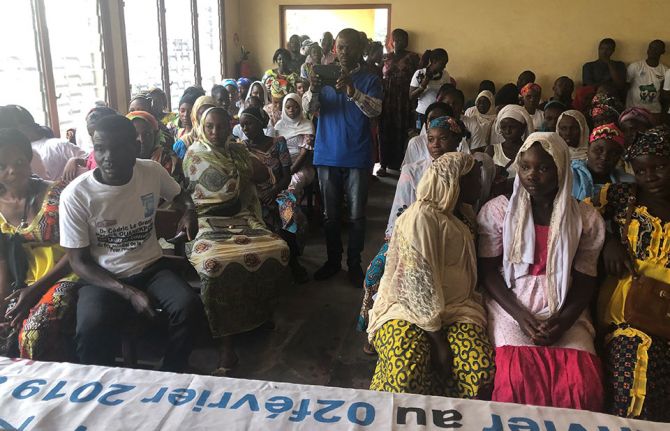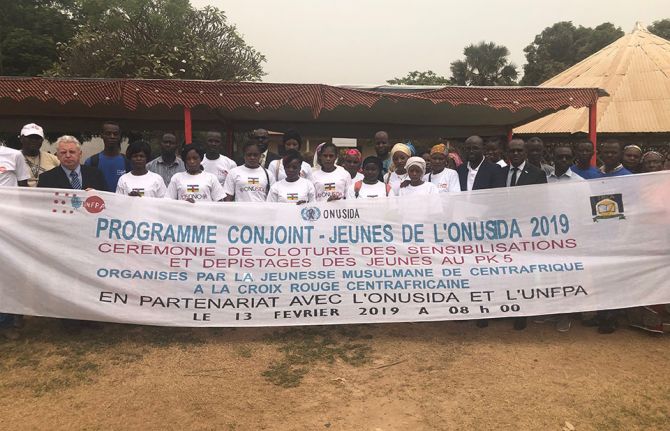


Feature Story
HIV testing campaign brings the community together in Bangui
19 February 2019
19 February 2019 19 February 2019The PK5 neighbourhood of Bangui, Central African Republic, is home to much of the city’s Muslim community. Once a bustling commercial area and the centre of Bangui’s nightlife, PK5 has become a no-go zone for many.
Like much of the country, the PK5 area and its population were greatly affected by the violence that engulfed the country in 2012 and 2013. The non-Muslim inhabitants of PK5 left; rival armed groups continue to exert control. Across the country, the consequences of the violence have led to a huge displacement of people and a humanitarian crisis. At the end of 2018, it was estimated that 2.9 million people—more than half of the country’s population—were in need of humanitarian assistance and protection.
However, the people of PK5 remain resilient. Recognizing the need for a greater awareness of HIV in the community, Muslim youth leaders and the Catholic University Center, with the support of UNAIDS, organized an HIV testing and awareness-raising campaign from 23 January to 13 February at the Henri Dunant Health Centre in PK5.
The campaign was the first of its kind to take place in PK5 since the 2012–2013 violence. In the two weeks of the campaign, 1500 people accessed voluntary HIV testing and counselling services. People who tested positive for HIV were referred for treatment.
The campaign was opened by Pierre Somse, the Minister of Health, during an event attended by religious leaders, women and young people. Mr Somse took an HIV test and stressed the importance of all people knowing their HIV status. Knowledge of HIV status in the country remains low, with only 53% of people living with HIV knowing their HIV status.
“The government is committed to intensifying its efforts to deliver health and social services to all Central Africans. PK5 is not forgotten and its population will not be left behind in our efforts to increase access to HIV testing, treatment, care and support,” said Mr Somse.
Pamela Ganabrodji, Head of Information and Counselling at the Henri Dunant Health Centre, added, “We are very proud of what we have achieved through this HIV campaign, but challenges remain. We call on the government and international partners to continue supporting the HIV and sexual and reproductive health activities of the Henri Dunant Health Centre, which are critical in a community where cultural and social taboos represent a key barrier.”
On the last day of the campaign, a community dialogue was held to discuss the HIV and sexual and reproductive health challenges faced by the people of PK5. The needs are urgent and range from basic health and social services to a lack of economic opportunities. Low access to modern contraceptives, incomplete knowledge about HIV and poverty contribute to making young people and women vulnerable to HIV.
“With this campaign, we, the young people of PK5, are showing that we are not helpless and that we are part of the solution for HIV and other social issues,” said Aroufay Abdel Aziz, President of the Muslim Youth of the Central African Republic.
A second phase of the HIV testing and sensitization campaign will continue until the end of March and will include focused HIV prevention messages with sensitization by peer educators and focus group discussions on HIV and sexual and reproductive health issues.
“UNAIDS will continue to engage the government and other United Nations agencies and partners to reinforce the involvement of young people in the HIV response,” said Patrick Eba, UNAIDS Country Director for the Central African Republic.
Region/country
Related
 Impact of the pause of US foreign assistance in Côte d'Ivoire
Impact of the pause of US foreign assistance in Côte d'Ivoire

19 February 2025


